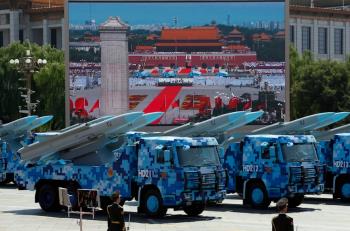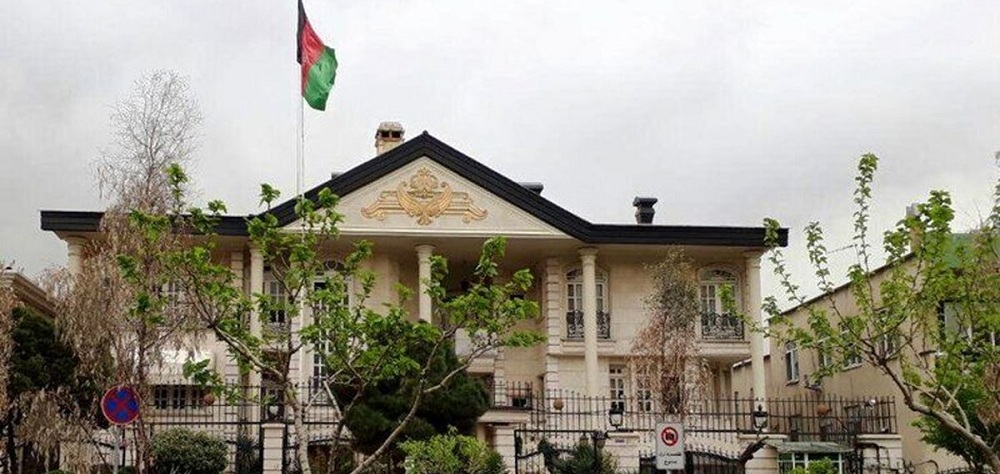Alwaght- 19 months after Taliban takeover of power in Afghanistan, the first step towards recognition of the group’s interim government in Kabul was taken by Iran. As part of this policy, on Sunday, Iran’s foreign ministry handed over Afghanistan embassy in Tehran to the Taliban officials.
“IEA-MoFA informs all Afghans residing in I.R Iran that the Afghan Embassy activities will continue in Tehran following the dispatching of newly appointed Chargé d’Affaires and diplomats with a firm commitment and spirit to serving the citizens of the two countries,” interim government spokesman Abdul Qahar Balkhi said in a tweet using acronym for Islamic Emirate of Afghanistan.
The Public Relation Office of Iran’s foreign ministry emphasized in a statement that the issue of handing over the Afghan embassy in Tehran was an internal matter of Afghanistan and that it has not interfered into the case.
Afghanistan media outlets have also quoted Afghan diplomats residing in Tehran as saying that Iran’s foreign ministry asked them to evacuate the embassy as soon as possible due to the refusal of 15 diplomats from this embassy to cooperate with the Taliban administration. According to reports, Fazl Mohammad Haqqani is set to serve as acting Afghanistan ambassador to Tehran. Earlier, Afghanistan embassies in Turkmenistan, Pakistan, Russia and China were handed over to the Taliban.
Relative improvement of relations with the Islamic Emirate in Afghanistan comes as with the inauguration of administration of President Sayyed Ibrahim Raeisi in Iran, which coincided with the Taliban takeover, Iran named a special presidential envoy, Hassan Kazemi Qomi, to Afghanistan, and a number of meetings were held between the two countries and bilateral relations improved day by day and eventually Afghanistan embassy was handed over to the Taliban.
Iran’s move comes as the international community had tied the recognition of Taliban rule to formation of an inclusive government consisting of all political groups and former Afghan officials. But no advances were made despite extensive pressure from foreign countries. Taliban officials claim the government they formed is a combination of all ethnic groups, but contrary to this claim, its members were chosen from people who fought alongside the Taliban against the American occupation and the local government over the past two decades, and they just have various ethnicities.
In all Afghanistan meetings attended by regional countries in Iran, Russia, and Uzbekistan, the main obsession has been formation of an inclusive government. To put strains on the Taliban, the Russians did not invite the group to an Afghanistan summit in mid-November, stressing that new rulers of Afghanistan should yield to international community demands to pave the way for foreign aids and protection of security and stability. The same demand was made by Iran repeatedly. However, some specific and effective factors in Tehran-Kabul relationship persuade Iran not to tie the embassy handover to inclusive government formation and follow this legitimate demand through other channels.
The need to address Afghan migrant affairs
Though some believe that Iran should not hand over the embassy to the Taliban until formation of a comprehensive government and cooperation with the international community, Tehran’s step is not a political concession and privilege to the interim government, but there are requirements between the two countries that need to be addressed. Having in mind that more than three million Afghan migrants live in Iran (even according to some statistics, about 6 million people), handling their affairs requires the cooperation of the Afghan government. But due to the lack of diplomatic relations between Iran and the Taliban, this issue has proven problematic for Iran and Afghan migrants.
Although previous government’s diplomats were present at the embassy, they lacked the power to make decisions on cases requiring coordination with Kabul, and naturally could not help the migrants. Return of migrants and addressing affairs of Afghanistan nationals and providing services to them in the absence of Afghanistan representatives grew difficult after Taliban takeover. Amid international ignorance of challenges the hosting countries facing, Iran found continuation of such situation seriously troublemaking. Actually, there is no alternative to cooperation with the Islamic Emirate to handle Afghanistan nationals’ affairs in Iran.
According to Iranian officials, after the new government assumed the power in Afghanistan, some administrative problems have arisen for the Afghans in Iran, and cooperation with the Taliban is needed to settle these problems.
Thousands of people who fled the country to Iran after the capture of Kabul by the Taliban do not have identity documents, and they need passports from their government, which is now the Taliban. With handover of embassy, illegal migrant s can see their problems settled and path to their return paved.
The situation of Afghan migrants was so important for Iran that at the end of December Tehran hosted a quadrilateral meeting with representatives of the Taliban, Pakistan and the United Nations High Commissioner for Refugees, and the Taliban pledged to provide infrastructure for the return of Afghan migrants and in the recent months, thousands of migrants returned to Afghanistan, and with the presence of the Taliban ambassador in Tehran, their return to their country will be accelerated.
Economically speaking, the migrants have heavy costs on Iran and can cause negative security, social, economic, and political repercussions in the future. Before the Taliban rise to power, according to agreements, Iran was sending back home thousands of them, and if they all are sent back home, one of Iran’s several-decade challenges would be resolved.
Iran plans to return Afghan migrants to their country as soon as possible, but in the absence of the Afghan ambassador, this has been a difficult job, and Iranian officials had to travel to Kabul to meet with Taliban officials, and the same problem existed for Taliban leaders. These frequent visits did not lead to concrete results, however. Therefore, a Taliban ambassador in Tehran will partially settle these problems.
From another perspective, Afghanistan insecurity poses a serious threat to the Iranian borders. The presence of ISIS terrorists in parts of Afghanistan and waves of terror they create every now and then with terrorist attacks can spread the insecurity to Iran’s borders. The Islamic Republic works to improve the relationship with the Taliban to eliminate the common threats.
Border and water share disputes
Another matter important in handover of the embassy to the Taliban is that since the assumption of power by the group in August 2021, border tensions have overshadowed Iran-Afghanistan relations, with several limited clashes reported between border guards of the two sides. Border tensions need to be eased through extensive political cooperation, and a resident ambassador in Tehran can very much contribute to this aim. Iran and Afghanistan share more than 900 kilometers of borders and absence of political cooperation could cause serious security challenges to the two countries. Actually, securing these massive borders takes a lot of job and realizing this aim is not possible with visits of representatives of two sides to each other’s capitals.
Another issue is that after taking the rule, the Taliban cut off Iran’s water share from Helmand River, causing harmful effects to the farmers in Iran’s Sistan and Baluchestan province. The group argues technical problems were behind the move, but this was an excuse and the decision was driven by political objectives. Some analysts argued that the Taliban sought to instrumentalize water to press Iran for recognition of interim government in Kabul, as Iranian recognition could mean similar steps by other countries. The water dispute was settled to some extent with negotiations and the group expressed commitment to allowing the water to flow to Iran afresh.
It is obvious that now the Taliban is the undisputed power in Afghanistan and other groups are devoid of the strength to return to power. Therefore, regional countries cannot forever wait for a political advancement in the country and have to face the fact and deal with the interim government. Absence of interactions with Taliban-ruled Afghanistan contributes to further insecurity in the country and this is not a good news for regional countries and even world community.



























